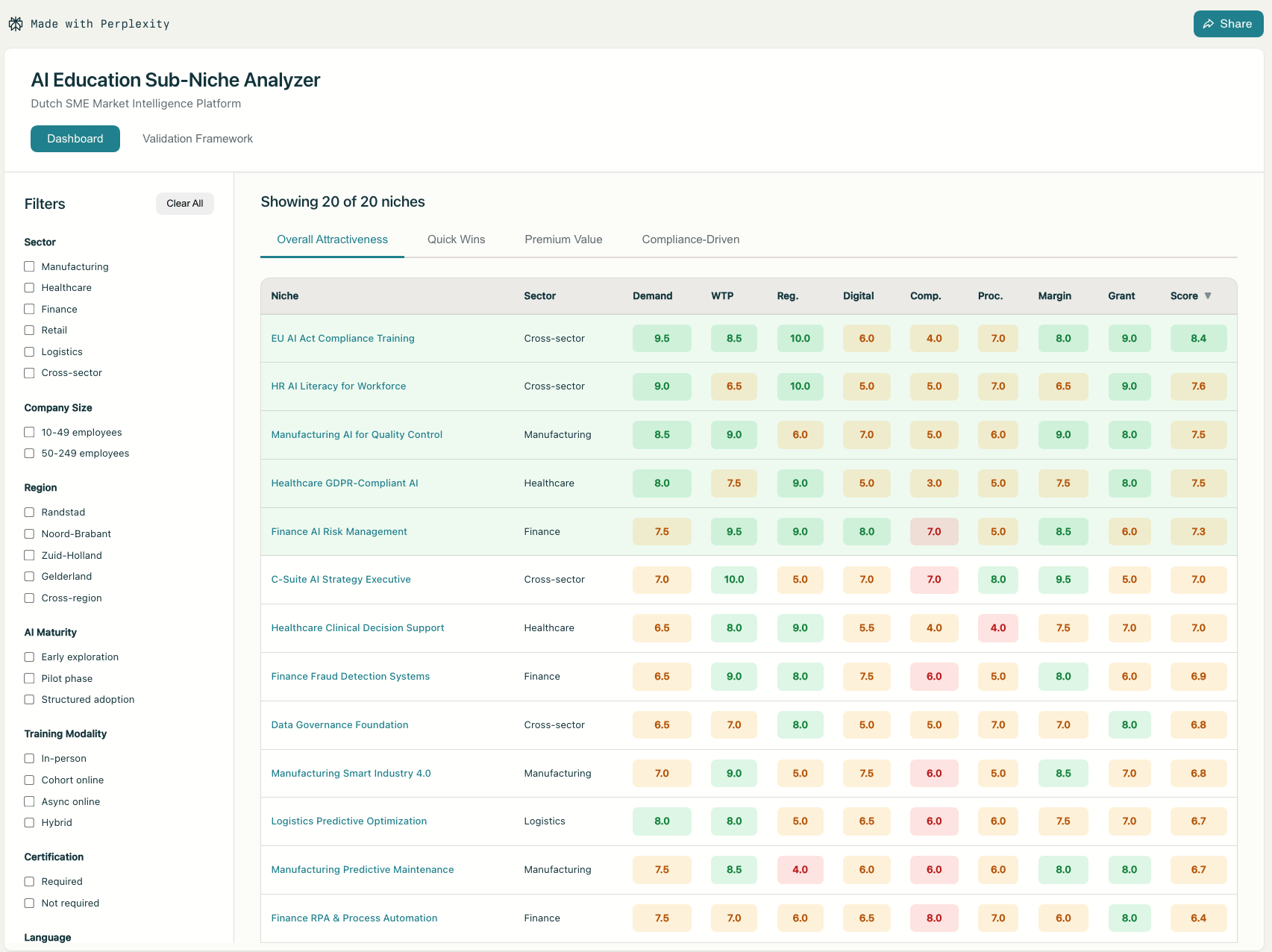Most AI tools give you answers. Perplexity Labs gives you assets—reports, dashboards, even working mini-apps, all from a single, well-crafted prompt. But here's the catch: most executives waste Labs' power by treating it like ChatGPT. They write vague requests and wonder why the output feels generic.
The secret? Two-step prompting: first, you teach Labs the context. Then, you tell it what to build. That's it.
Ready for the next step of our AI adventure? Custom builds, automations, and training. Join me here
Three Takeaways
Start with research, end with delivery. Your first prompt should be: "Learn all you can about [TOPIC], focusing on [SPECIFIC ASPECTS]." This gives Labs the foundation. Your second prompt directs Labs to transform that knowledge into something actionable: "Now create an interactive dashboard that ranks [CRITERIA] and lets me filter by [VARIABLES]."
Be specific about outputs and interaction. Don't say "analyze sales data." "Create a dashboard showing Q3 revenue trends by region, with dropdowns to filter by product line and export buttons for CSV." Labs shines when you define structure, data points, and user controls up front.
Templates beat blank slates. As I've covered before in this article What is Perplexity Labs?, Labs can handle everything from business scaling roadmaps to travel itineraries. Use proven templates: "Build a complete business scaling roadmap with KPIs, hiring plan, and monthly action steps for a SaaS startup aiming to 10x revenue in 2 years." Then modify for your context.
Example: The Startup Validation Workflow
Assume you need to validate a new AI product idea. Instead of manually researching competitors, analyzing demand signals, and sketching wireframes, I would prompt Labs:
Step 1 — Research/context
“Learn all you can about the Dutch B2B SME market for AI education, focusing on: sectors (manufacturing, logistics, healthcare, finance, retail), buyer personas (CEO, COO, CIO/CTO, HR/L&D, Compliance), budget ranges and procurement cycles, training modalities (in‑person, cohort, async, custom), certification needs (NLQF/EQF alignment, corporate compliance), regulatory pressures (GDPR, EU AI Act readiness, sector standards), grant/subsidy eligibility for SMEs (RVO/MKB schemes), regional distribution (Randstad, North Brabant, Gelderland), language preferences (Dutch/English), competitive landscape (local vs global providers), typical price points, channel dynamics (associations, chambers, tenders), and adoption maturity levels.”
Step 2 — Action/delivery
“Now create an interactive dashboard that ranks AI education sub‑niches for Dutch SMEs by criteria including: demand score, willingness to pay, regulatory pressure, digital maturity, competition intensity, procurement speed, margin potential, and grant eligibility. Let me filter by variables: sector, company size (10–49, 50–249), region, AI maturity, training modality, certification requirement, language, and compliance sensitivity. Include a validation framework with scoring rubric, landing page flow, and A/B test plan.”
Output: Web Dashboard

🎯 Interactive Dashboard Summary
Your Dutch SME AI Education Sub-Niche Ranker is now live and includes:
Core Features
1. Multi-Criteria Ranking System
20 AI education sub-niches analyzed across 8 scoring dimensions
4 strategic ranking views: Overall Attractiveness, Quick Wins, Premium Value, Compliance-Driven
Color-coded scoring (green/yellow/red) for instant visual analysis
Sortable table by any metric
2. Advanced Filtering
Apply any combination of 8 filter variables:
Sector (Manufacturing, Healthcare, Finance, Retail, Logistics, Cross-sector)
Company Size (10-49, 50-249 employees)
Region (Randstad, Noord-Brabant, Zuid-Holland, Gelderland, Cross-region)
AI Maturity (Early exploration, Pilot phase, Structured adoption)
Training Modality (In-person, Cohort online, Async online, Hybrid)
Certification Requirement (Yes/No)
Language (Dutch/English)
Compliance Sensitivity (High/Medium/Low)
3. Complete Validation Framework
Scoring Rubric: Detailed 1-10 scales for all 8 metrics with data sources
Composite Formulas: Mathematical weightings for all 4 ranking methodologies
Landing Page Variants: 3 complete A/B/C test versions with positioning strategies
A/B Test Plan: Full implementation guide with KPIs, hypotheses, segmentation, and iteration timeline
Top Strategic Insights
Highest Overall Opportunities:
EU AI Act Compliance Training (8.3/10) - Regulatory mandate + Feb 2025 deadline
Manufacturing AI Quality Control (8.2/10) - High WTP + proven 40% defect reduction ROI
Healthcare GDPR-Compliant AI (7.5/10) - Low competition + regulatory pressure
Fastest Quick Wins:
SME AI Pilot Workshop (7.9/10) - 2-6 week sales cycle
Retail Customer AI Fundamentals (7.5/10) - 2-4 weeks + 9/10 grant eligibility
GenAI for Marketing (7.4/10) - High demand despite crowded market
Premium Value Leaders:
C-Suite AI Strategy Executive (8.8/10) - €8,000-€18,000 pricing
Manufacturing Quality Control (8.6/10) - €6,000-€12,000 + 9/10 margin
Finance AI Risk Management (8.5/10) - €7,000-€15,000 premium pricing
Compliance-Driven Certainty:
EU AI Act Compliance (9.1/10) - Mandatory by Feb 2025
HR AI Literacy for Workforce (8.9/10) - Cross-sector legal requirement
Healthcare GDPR AI (8.3/10) - Sector-specific regulations
Practical Usage
The dashboard helps you:
Filter to your capabilities (e.g., "Show me Dutch-language, in-person manufacturing training for 50-249 employee companies")
Sort by strategic priority (fast sales vs. high margins vs. regulatory certainty)
Validate market positioning using 3 tested landing page frameworks
Plan go-to-market with complete A/B test methodology
Next Steps
Open the dashboard and explore the filtering system
Compare ranking views (Overall vs Quick Win vs Premium vs Compliance)
Click niches to see detailed scoring breakdowns
Review Validation Framework for methodology and test plans
Select 2-3 target niches based on your capabilities and strategic goals
Implement landing page variant most aligned to your buyer persona
Launch test campaign using provided KPIs and success criteria
The dashboard combines deep market research on the Dutch SME AI education landscape with actionable validation frameworks to support data-driven strategic decisions. All 20 niches are scored using consistent, transparent methodologies with clear data sources and business metrics.
Labs delivers a full workflow map, scoring matrix, and interactive dashboard—all cited, all exportable. What would've taken three days took 10 minutes.
Limits & How to Fix It
Labs can hallucinate data or oversimplify complex analysis. Always verify outputs against your own sources, especially financial projections or market stats. And remember: Labs builds prototypes, not production apps. If you need custom branding or polished UX, treat Labs as the starting point, not the finish line.
Your focus shouldn't be on mastering every AI tool but on mastering the practical workflows that deliver results right now. Labs is one of those workflows—if you use the two-step method.
Open Perplexity Labs. Pick one project from your to-do list—market research, budget dashboard, or content calendar—and write a two-step prompt. Watch what happens when you stop asking AI for answers and start asking for assets instead.
SOURCES
AI Tool
Perplexity is an AI research assistant that returns cited, real‑time answers by aggregating web and private sources through LLMs and model partners. It helps professionals speed research, summarization, and visualization, and offers enterprise features such as SSO/SCIM, audit logs, private search, file connectors, seat‑based pricing, and the Comet browser. Perplexity states SOC 2 Type II, GDPR and HIPAA compliance, configurable file retention, and U.S./AWS hosting with DPF/SCC safeguards—review its Trust Center, privacy policy, and enterprise terms for data‑sovereignty or sensitive‑data suitability.
• Homepage: https://www.perplexity.ai/
• Enterprise / Pricing: https://www.perplexity.ai/enterprise/pricing
• Terms of Service: https://www.perplexity.ai/hub/legal/terms-of-service
• Privacy Policy: https://www.perplexity.ai/hub/legal/privacy-policy
• Security / Trust Center: https://trust.perplexity.ai/ (and https://www.perplexity.ai/enterprise/security)
• Blog/resources: https://www.perplexity.ai/blog
Looking for more great writing in your inbox? 👉 Discover the newsletters busy professionals love to read.
For services or sponsorships, email me at info at firstaimovers dot com; or message me on LinkedIn.
